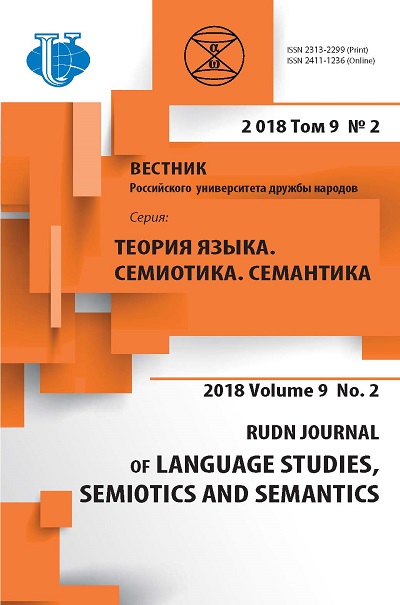SEMANTIC ASPECT OF THE LINGUISTIC DESCRIPTION OF LEXICON OF ORTHODOX DOGMA IN CHURCH SLAVONIC LANGUAGE
- Authors: Feliksov S.V.1
-
Affiliations:
- Saint Tikhon's Orthodox University
- Issue: Vol 9, No 2 (2018)
- Pages: 335-350
- Section: Functional and Comparative semantics
- URL: https://journals.rudn.ru/semiotics-semantics/article/view/18747
- DOI: https://doi.org/10.22363/2313-2299-2018-9-2-335-350
- ID: 18747
Cite item
Full Text
Abstract
In article one of relevant and not enough studied problems connected with a question of semantic classification of lexicon of orthodox dogma functioning in texts of Church Slavonic language is considered. The author notes that the experiences of semantic division of lexicon of the religious sphere presented in scientific literature more carry applied, than fundamental character. It in many respects is explained by absence from the scientists dealing with this problem, complete approach to consideration of the studied subject. Overcoming methodological unilaterality, lexicon of orthodox dogma in work receives the semantic description as taking into account those values which are recorded at it in lexicographic and text sources of Church Slavonic language, and with a support on extralinguistic factors. Such approach allowed to develop, according to the author, the accurate bases for semantic division of religious language units and to develop the universal classification scheme allowing to describe all that variety of lexicon of orthodox dogma which exists in Church Slavonic language on its base. Defining the teoretiko-practical importance of the results received during the research, in work it is noted that the submitted solution of a linguistic problem can be used in the methodical purposes when writing education guidances on Church Slavonic language and also it will be useful by drawing up the semantic dictionary of religious lexicon.
About the authors
Sergej Vladimirovich Feliksov
Saint Tikhon's Orthodox University
Author for correspondence.
Email: svfeliksov@gmail.com
Candidate of Philological Sciences, Associate Professor at the Department of Pedagogics and Methodology of Primary Education Saint Tikhon's Orthodox University; Interests: teolinguistics, church lexicographies, Church Slavonic language
Novokuzneckaja 23-5A, Moscow, Russia, 115184References
- Alipij (Gamanovich) (1991). Grammar of Church Slavonic language. Moscow: Palomnik. (In Russ.).
- Vorobeva, A.G. (2014). Textbook of Church Slavonic language. Moscow: Izd-vo PSTGU. (In Russ.).
- Andrej (Jerastov) (2007). Grammar of Church Slavonic language: abstracts, exercises, dictionary. Saint Petersburg: Bibliopolis. (In Russ.).
- Pletneva, A.A., Kraveckij, A.G. Church Slavonic language. Moscow: Ast-Press Kniga. (In Russ.).
- Mironova, T.L. (2014). Church Slavonic language. Moscow: Izd-vo Moskovskoj Patriarhii Russkoj Pravoslavnoj Cerkvi. (In Russ.).
- Kamchatnov, A.M. A grief we have hearts, or Once again to a question of church service language. URL: http://www.bogoslov.ru. (accessed:10.12.2017).
- Musorin, A.Ju. (2010). Specific problems of studying of lexicon of modern Church Slavonic language. Bulletin of the Nizhny Novgorod University. Series: History, philology. 10 (2), 115—118. (In Russ.).
- Matveeva, O.A. (2013). Church Slavonic lexicon as terminosistema: [abstract of dissertation]. Moscow. (In Russ.).
- Skljarevskaja, G.N. (2007). Dictionary of orthodox church culture. Saint Petersburg: Nauka. (In Russ.).
- Gorjushina, R.I. Lexicon of Christianity in Russian (the system relation of direct confessional and derivative secular words): [abstract of dissertation]. Volgograd. (In Russ.).
- Koroleva, I.A. (2003). Orthodox sacral and liturgical lexicon in the art text: [abstract of dissertation]. Volgograd. (In Russ.).
- Petuhova, M.E. (2003). Functional features of church lexicon with subject value in Russian: [abstract of dissertation]. Kazan. (In Russ.).
- Bulavina S.V. (2003). Russian fixed word-combination containing Church-religious vocabulary: [abstract of dissertation]. Moscow. (In Russ.).
- Mihajlova, Ju.N. (2004). Religious orthodox lexicon and its destiny (according to explanatory dictionaries of Russian): [abstract of dissertation]. Yekaterinburg, 2004. (In Russ.).
- Matej, I.K. (2012). Orthodox lexicon in modern Russian and language consciousness of its carriers: [abstract of dissertation]. Voronezh, 2012. (In Russ.).
- Timirhanov, V.R., Mihajlova, A.G. (2017). Features of a terminologization of lexicon of the religious sphere in domestic linguistic tradition. The Bulletin of the Bashkir university, 22(2), 483—487. (In Russ.).
- Aksakov, K.S. (2011). Experience of the Russian grammar. Moscow: URSS. (In Russ.).
- Losev, A.F. (1993). Life. Name. Space. Moscow: Mysl. (In Russ.).
- Losev, A.F. (1997). Name. Saint Petersburg: Aletejja. (In Russ.).
- Florenskij, P.A. (2013). At thought watersheds. Moscow: Akademicheskij proekt. (In Russ.).
- Bulgakov, S.N. (2008). Name philosophy. Saint Petersburg: Nauka. (In Russ.).
- Kamchatnov, A.M. (1998). History and hermeneutics of the Slavic Bible. Moscow: Nauka. (In Russ.).
- Kamchatnov, A.M., Nikolina, N.A. (2002). Introduction to linguistics. Moscow: Flinta. Nauka. (In Russ.).
- Postovalova, V.I. (2016). Science about language in the light of an ideal of integral knowledge: In search of integrated paradigms. Moscow: Lenand. (In Russ.).
- Church heavenly and terrestrial. (2008). Moscow: Sibirskaja blagozvonnica. (In Russ.).
- Ignatij (Brjanchaninov) (2003). Complete collection of creations. Vol. 5. Moscow: Pilgrim (In Russ.).
- Feofan (Vyshenskij) (2014). Holy Fathers about a prayer and sobriety. Moscow: Direkt-Media (In Russ.).
- Ivanov, M.S. (1991). Church and the world. In: About belief and morality according to the doctrine of Orthodox Church. Moscow: Moscow patriarchy. (In Russ).
- Iannuary (Ivlev) (1990). Secret and Revelation. Christian reading, 3, 61—67. (In Russ.).
- Davydenkov, O. (1997). Dogmatic divinity. Moscow: PSTBI. (In Russ.).
- Bulgakov, S. (1917). Not evening light. Sergiyev Posad: Tipografija I. Ivanova. (In Russ.).
- Alekseev, P.A. (1817—1819). Church dictionary. Saint Petersburg. (In Russ.).
- Djachenko, G. (2013). Unabridged Church Slavonic dictionary. Moscow. (In Russ.).
- Kamchatnov, A.M. (1997). The page from history of fight for Church Slavonic language. Annual theological conference of Saint Tikhon's Orthodox Institute. Moscow: Saint Tikhon's Orthodox Institute, 71—74. (In Russ.).
- Kuznecova, A.I. The syncretism zones creating a continuum of lexical system of language. URL: http://www.dialog-21.ru/media/2397/kuznecovaa.pdf. (accessed: 10.12.2017).
- Filin, F.P. (2009). About lexico-semantic groups of words. In: The General lexicology. Anthology. Voronezh: Voronezh State University. (In Russ.).
Supplementary files












